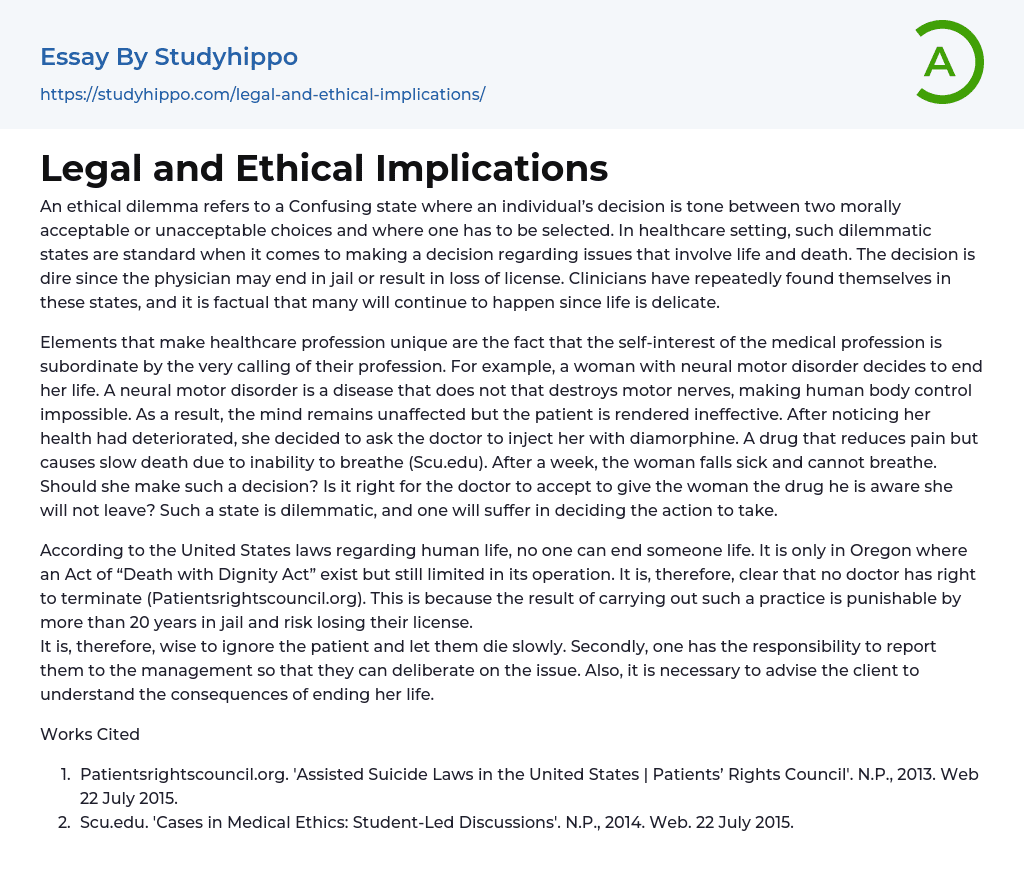An ethical dilemma refers to a Confusing state where an individual’s decision is tone between two morally acceptable or unacceptable choices and where one has to be selected. In healthcare setting, such dilemmatic states are standard when it comes to making a decision regarding issues that involve life and death. The decision is dire since the physician may end in jail or result in loss of license. Clinicians have repeatedly found themselves in these states, and it is factual that many will continue to happen since life is delicate.
Elements that make healthcare profession unique are the fact that the self-interest of the medical profession is subordinate by the very calling of their profession. For example, a woman with neural motor disorder decides to end her life. A neural motor disorder is a
...disease that does not that destroys motor nerves, making human body control impossible. As a result, the mind remains unaffected but the patient is rendered ineffective. After noticing her health had deteriorated, she decided to ask the doctor to inject her with diamorphine. A drug that reduces pain but causes slow death due to inability to breathe (Scu.edu). After a week, the woman falls sick and cannot breathe. Should she make such a decision? Is it right for the doctor to accept to give the woman the drug he is aware she will not leave? Such a state is dilemmatic, and one will suffer in deciding the action to take.
According to the United States laws regarding human life, no one can end someone life. It is only in Oregon where an Act of “Death with Dignity Act” exist but still limited in its
operation. It is, therefore, clear that no doctor has right to terminate (Patientsrightscouncil.org). This is because the result of carrying out such a practice is punishable by more than 20 years in jail and risk losing their license.
It is, therefore, wise to ignore the patient and let them die slowly. Secondly, one has the responsibility to report them to the management so that they can deliberate on the issue. Also, it is necessary to advise the client to understand the consequences of ending her life.
Works Cited
- Patientsrightscouncil.org. 'Assisted Suicide Laws in the United States | Patients’ Rights Council'. N.P., 2013. Web 22 July 2015.
- Scu.edu. 'Cases in Medical Ethics: Student-Led Discussions'. N.P., 2014. Web. 22 July 2015.
- Adaptation essays
- Adventure essays
- Adversity essays
- Aging essays
- Alcohol essays
- Barbie Doll essays
- Beauty essays
- Care essays
- Carpe diem essays
- Change essays
- Chess essays
- Chicken essays
- Choices essays
- Contrast essays
- Crops essays
- Development essays
- Dream essays
- Evil essays
- Experience essays
- Family essays
- Farm essays
- Fire essays
- First Love essays
- Focus essays
- Greed essays
- Hero essays
- Holiday essays
- House essays
- Housing essays
- Humility essays
- Humor essays
- Hypocrisy essays
- Integrity essays
- Law of Life essays
- Life Changing Experience essays
- Life Experience essays
- Lifestyle essays
- Limitations essays
- Love Story essays
- Mother Tongue essays
- Motherhood essays
- My Neighborhood essays
- Myself essays
- Mystery essays
- Narcissism essays
- Never Give Up essays
- Nursing essays
- Object essays
- Opportunity essays
- Peel essays




